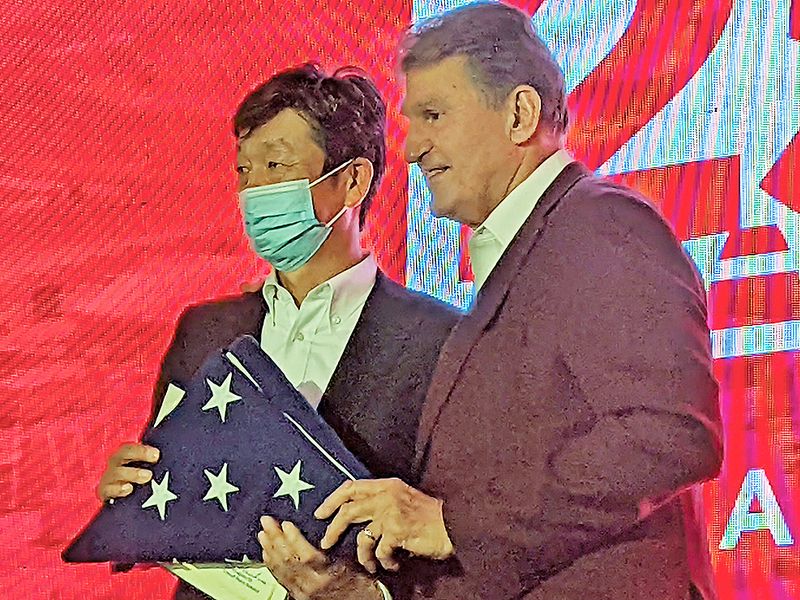
BUFFALO, W.Va. — Opposition from West Virginia Sen. Joe Manchin to a proposed $4,500 additional federal tax credit for electric vehicles built by union labor in the U.S. got a warm response from those who have spent months lobbying to kill the provision in the Democrats’ nearly $2 trillion Build Back Better Act.
Manchin said this week that he opposes the additional taxpayer-funded incentive — which would give General Motors, Ford Motor Co. and potentially Stellantis an advantage over nonunionized automakers that will assemble EVs in the U.S. — at an event announcing a $240 million investment from Toyota Motor North America into a 25-year-old components plant here.
The coal-state Democrat, whose moderate political leanings have already shaped much of the massive bill that would address climate change, child care and health care coverage because of the evenly split Senate, had not previously spoken publicly about the $4,500 incentive championed by Michigan Sen. Debbie Stabenow and Rep. Dan Kildee.
On the stage here, Manchin told Toyota workers that the provision unfairly disadvantaged them.
“I’m all for anybody to unionize. … I’m up for all workers and I think most people in public life should be that way. We want you to have the best quality and opportunity in your life. But with that, you make your decisions and what’s best for you and your workplace. But it’s unfair for the federal government to start saying we’re going to pick winners and losers,” Manchin said. “I couldn’t come to you if I would support something like that and say, ‘Hey, so sorry to tell you this, but we’re going to give an extra $4,500 to vehicles made by a union shop for General Motors or Ford up in Detroit, and your tax dollars are going to pay for your competition to take away your business.’ That is so unjust and unfair, it really is.”
Toyota, American Honda and Volkswagen Group of America are among automakers that have fiercely opposed the proposed tax credit. And some dealers have lobbied against it, led by the American International Automobile Dealers Association.
AIADA Chairman Steve Gates, whose Gates Auto Family group operates 10 dealerships with seven franchises in Kentucky, Indiana and Tennessee, said he was “frankly thrilled” to learn of Manchin’s opposition.
“I wasn’t expecting anybody to speak out at this point. It was fantastic,” Gates said. He said he’s spent “countless hours” trying to get dealers engaged on the issue, but said he’s been hamstrung because his legislators are all Republicans.
Republicans have vowed to oppose the Build Back Better Act.
“I think we’ve been successful in getting more dealers involved; it’s almost an obsession,” Gates said, adding that he has been focused on encouraging sympathetic dealers who have Democratic representatives to weigh in on the issue. “I talk to anybody and everybody about it.”
Manchin told Automotive News his opposition to the provision was immediate.
“When I heard about this, what they were putting in the bill, I went right to the sponsor [Stabenow] and I said, ‘This is wrong. This can’t happen. It’s not who we are as a country. It’s not how we built this country, and the product should speak for itself,’ ” he said. “We shouldn’t use everyone’s tax dollars to pick winners and losers. If you’re a capitalist economy that we are in society then you let the product speak for itself, and hopefully, we’ll get that, that’ll be corrected.”
Asked what Stabenow’s response was, he said: “Not good. I respect that, because she’s fighting for her [constituents] and I’m fighting for mine. I’m just fighting for fairness in the system, and hopefully, we’ll prevail.”
Stabenow’s office released a statement in response, saying: “Senator Manchin and I work together on many issues, and I was proud to stand with him two years ago to help the members of the United Mine Workers of America union in West Virginia. At that time, some argued his bill was unfair and was picking winners and losers. But we rejected that argument and stood together to protect union pensions. This issue is no different. Standing up for hardworking Americans is always the right thing to do.”
At the event to announce Toyota’s investment to build hybrid transaxles, Ted Ogawa, CEO of Toyota Motor North America, told Manchin and others in attendance that “to be successful, we need the opportunity to compete on an equal, level playing field with all automakers.
“Given that chance, without any added disadvantage placed on the backs of our team members, we are confident you will help build vehicles customers will choose in an open marketplace.”

